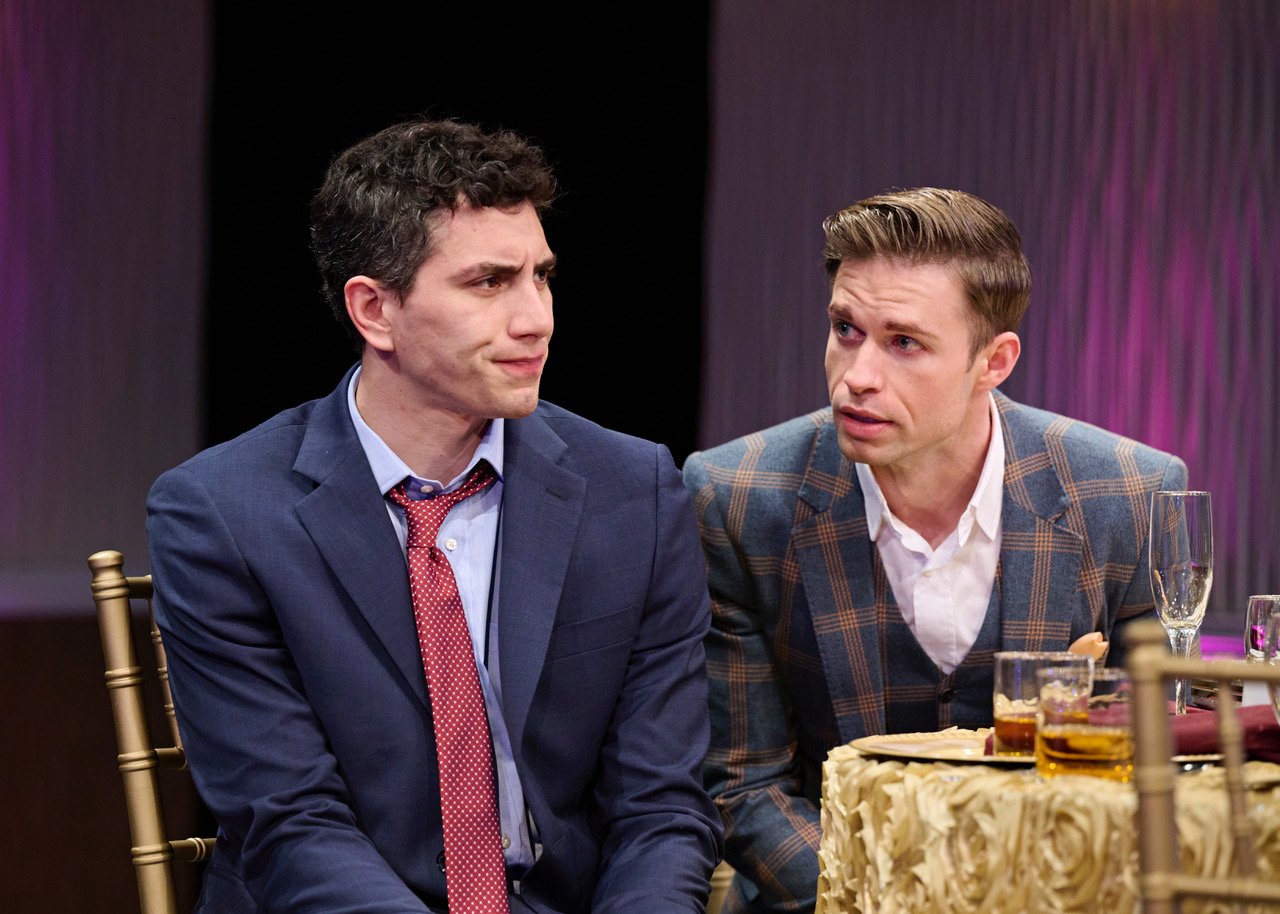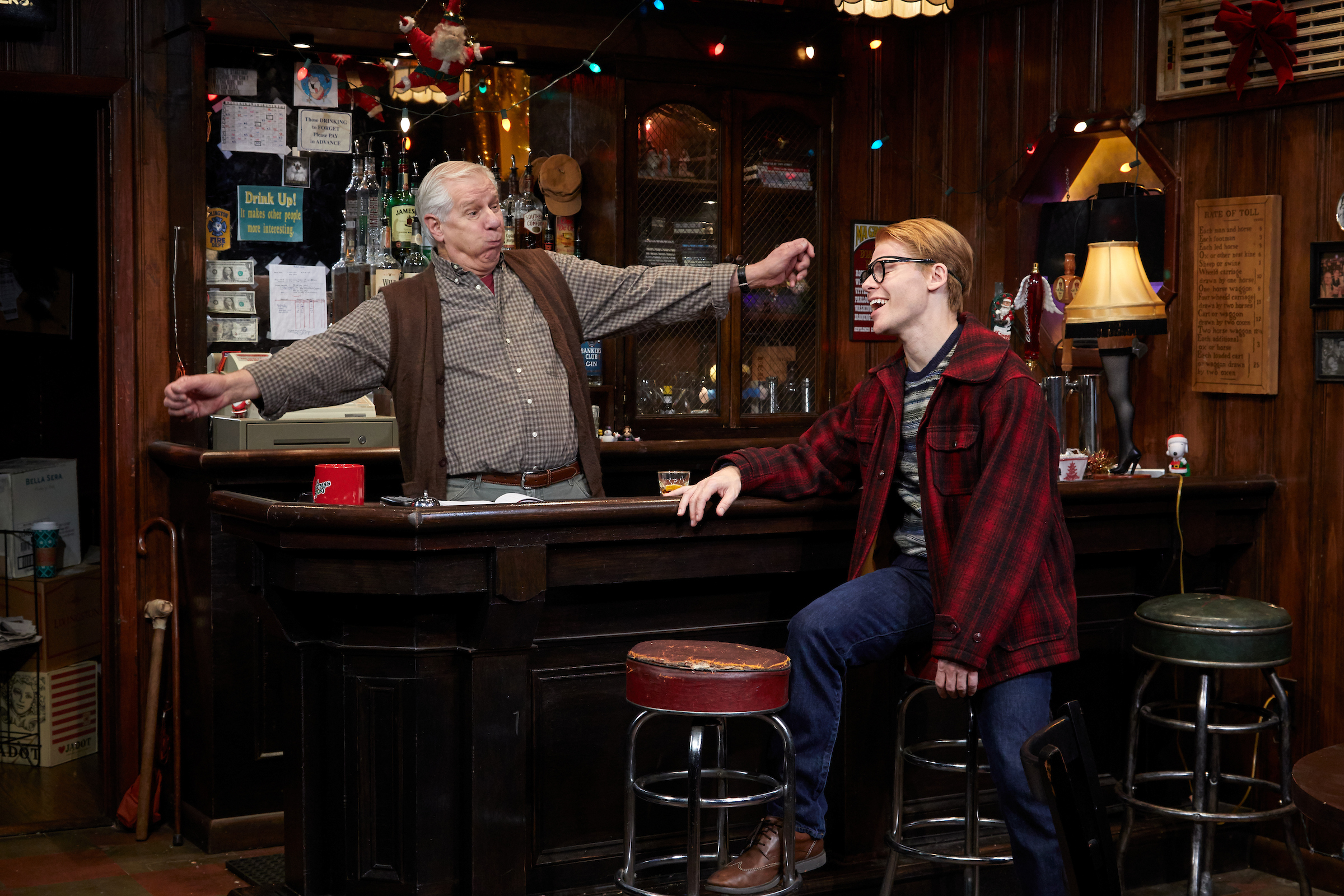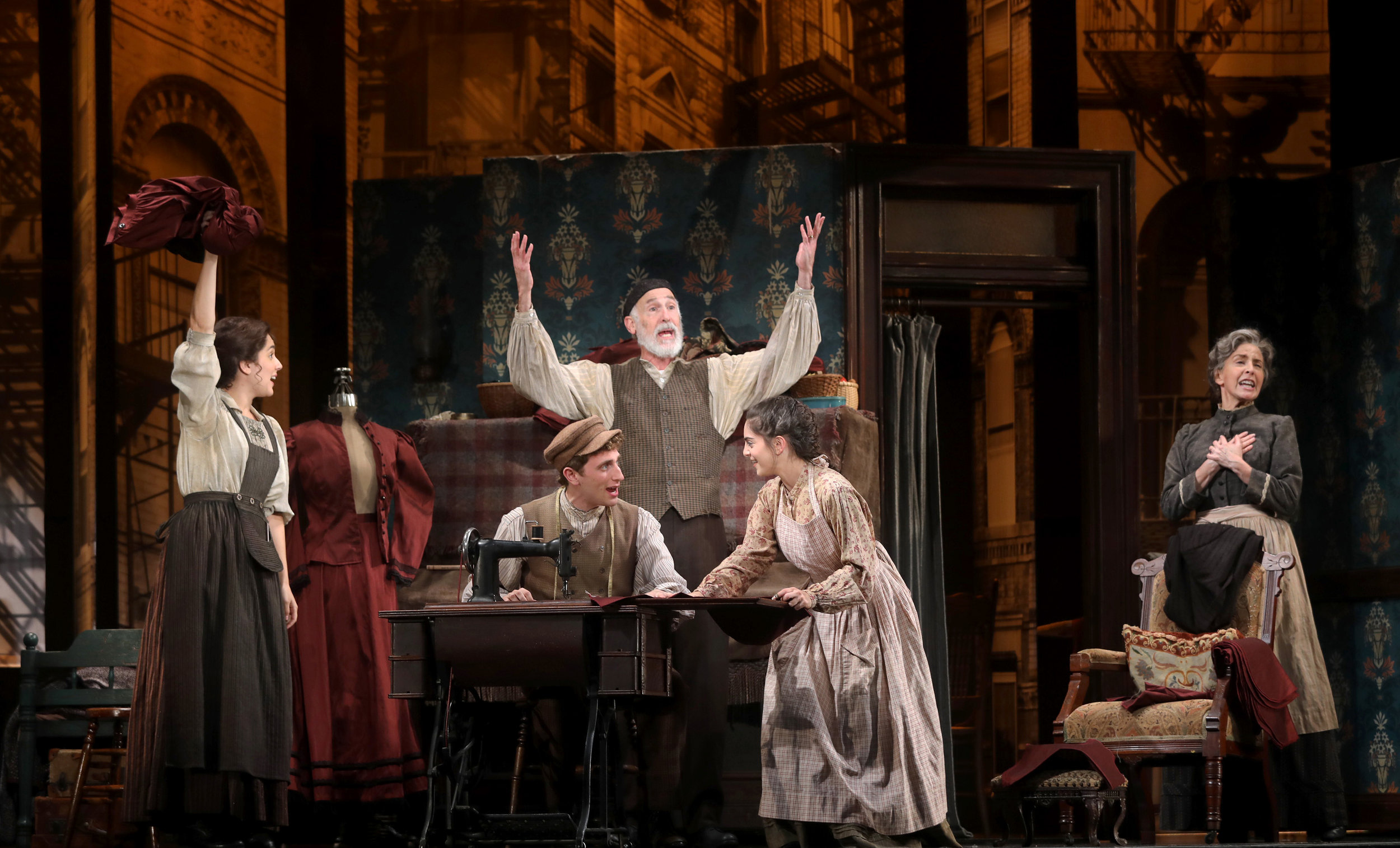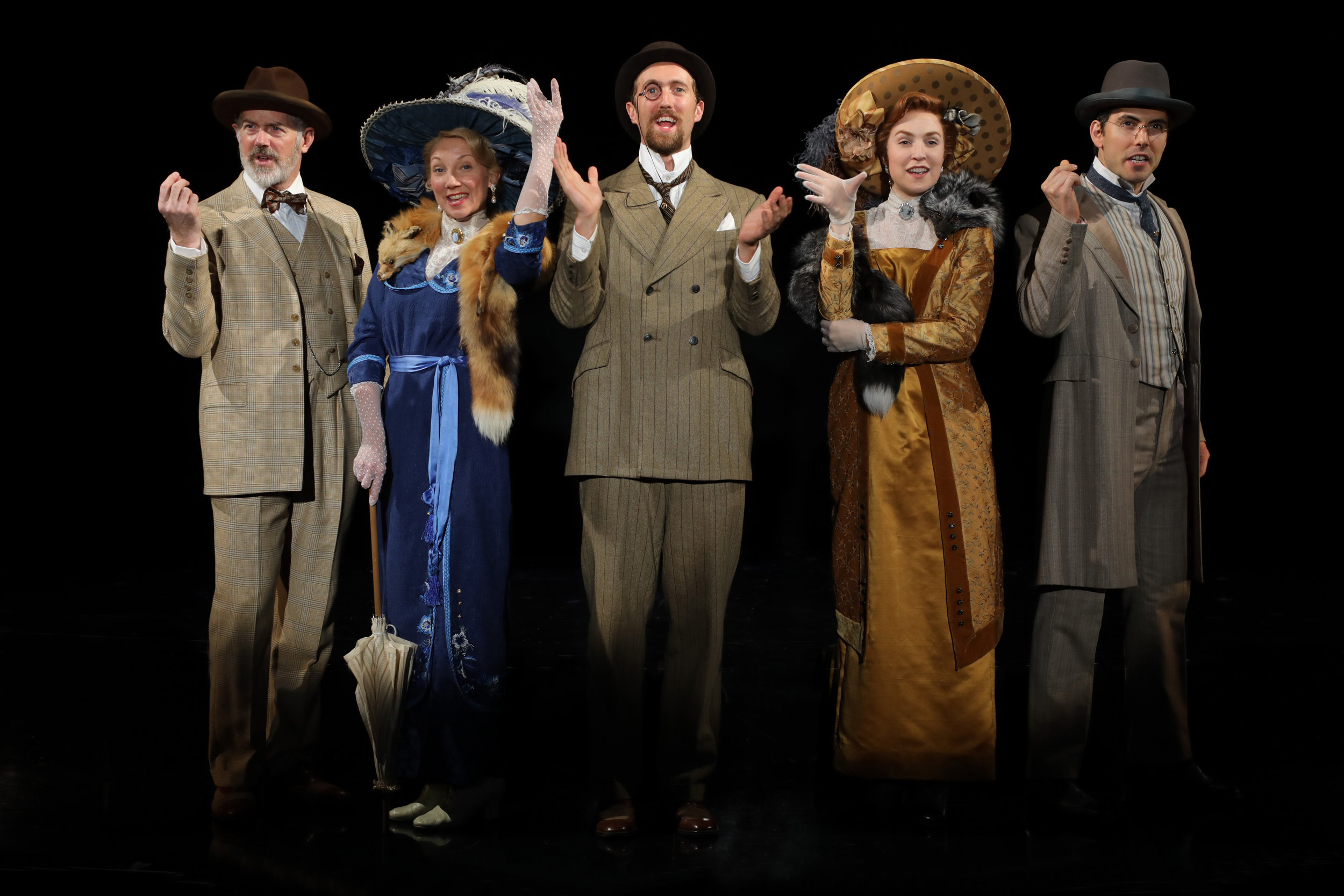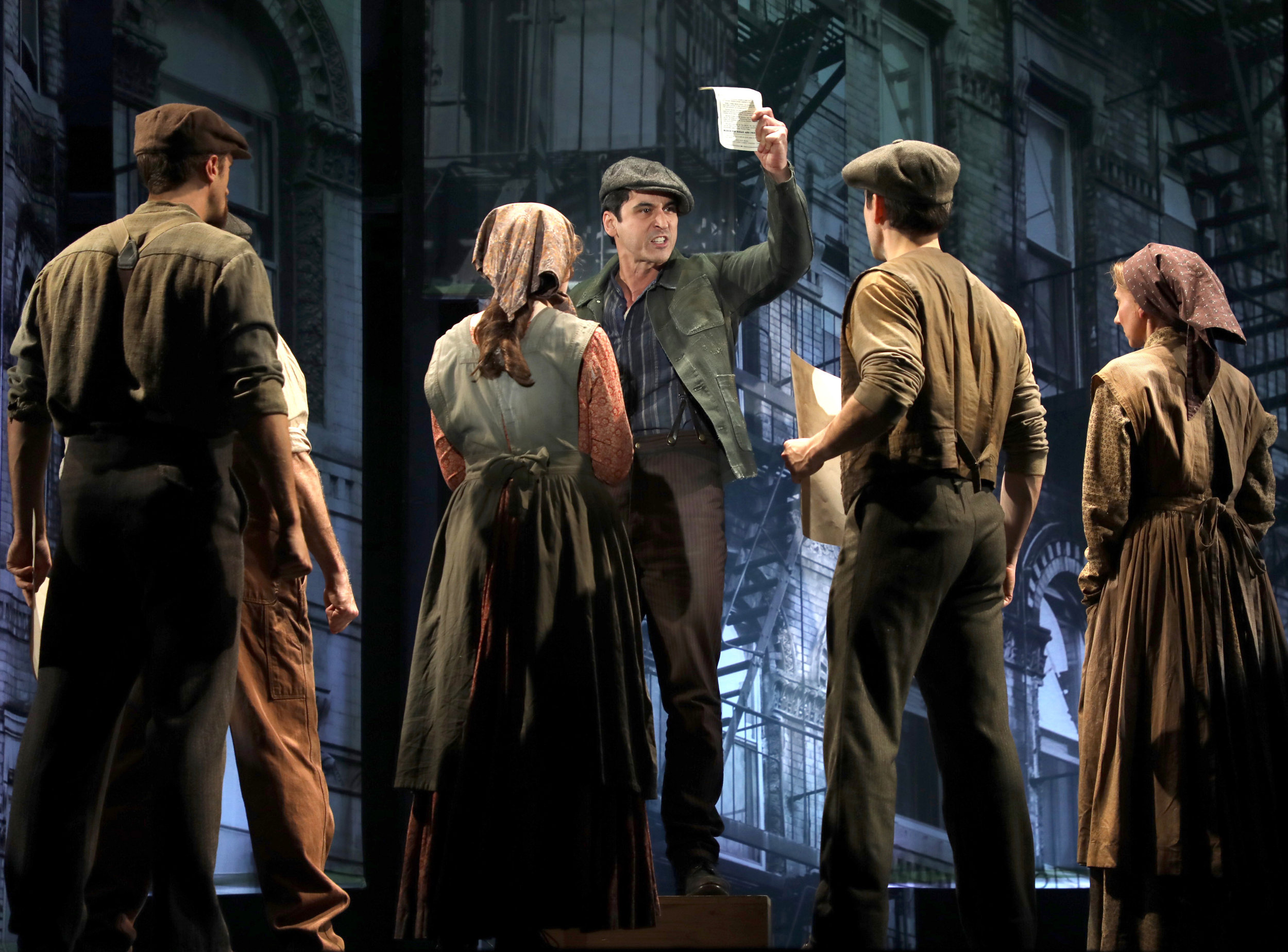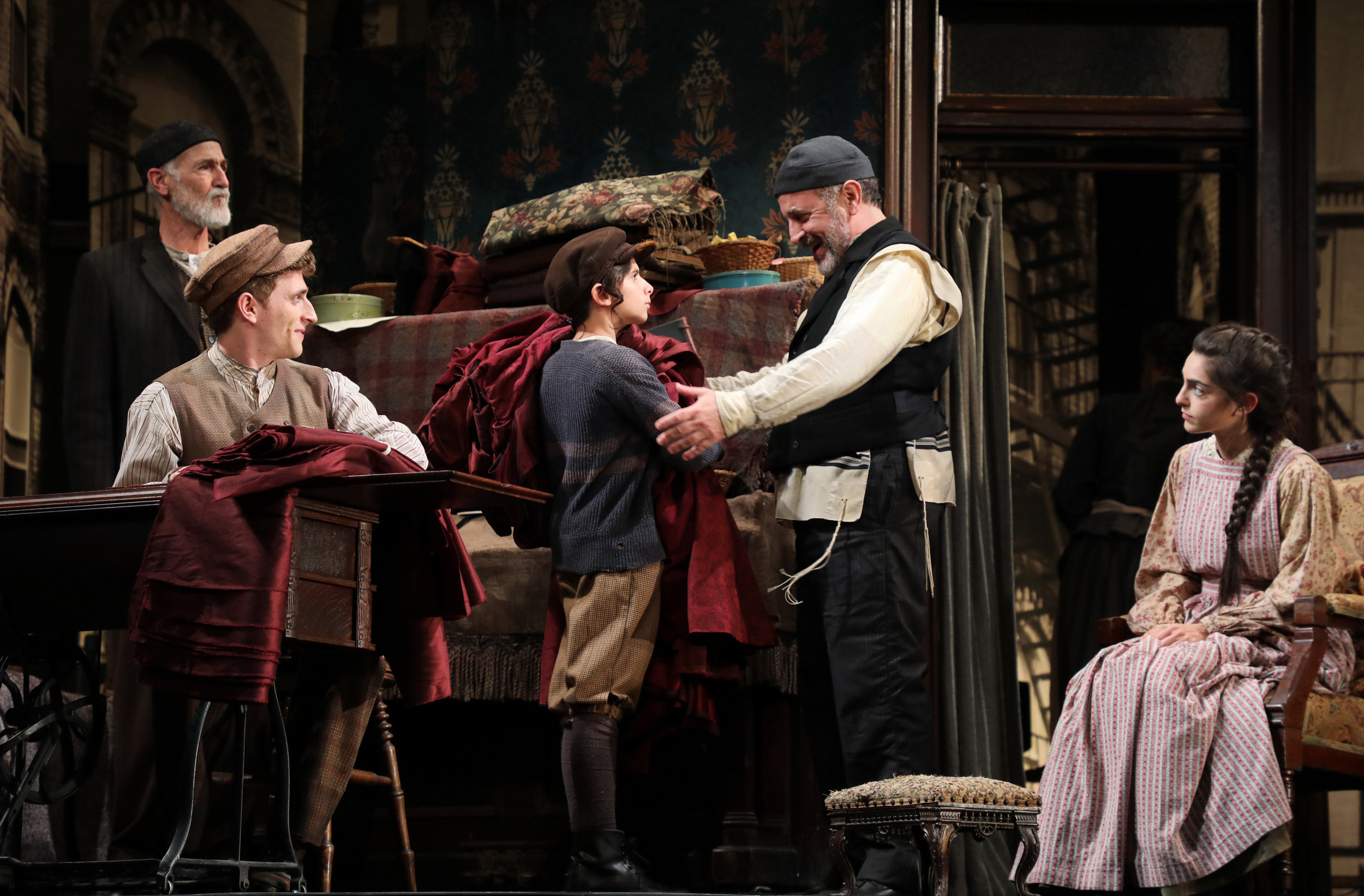Review of Zoey’s Perfect Wedding, TheaterWorks
Fairly early in Matthew López’s Zoey’s Perfect Wedding, now playing at TheaterWorks in Hartford directed by Rob Ruggiero, Rachel, a drunken wedding planner who was not hired to plan—nor asked to be a bridesmaid at—the wedding of Zoey, a “best friend” from college, sounds off on a live mic. She wants us to know that elaborate weddings, no matter how well planned and “perfect,” do not equate with a happy marriage. She insists that more effort should be put into marriages, not weddings. It’s a tirade that is aimed, we don’t doubt, at the state of her own marriage, but it also might make us wonder: if weddings do indeed get too much attention, why play out the all-too-familiar tropes of big wedding receptions in a new play?
The answer, I suppose, is that we’re all ready to be amused by what can go wrong. Will we be embarrassed, titillated, angered, made to cringe or squirm, forced to laugh or cry or to drink heavily? Certainly that and more happens to all the characters we meet. More—who we don’t see—are potentially even more put out.
Blair Lewin as Rachel in Zoey’s Perfect Wedding by Matthew López, at TheaterWorks, Hartford, directed by Rob Ruggiero (photo by Mike Marques)
We meet six people at this 200-person reception: Zoey’s friend Rachel (Blair Lewin); Rachel’s husband Charlie (Daniel José Molina, but on the night I saw it played by understudy Stephen Stocking); Sammy (Hunter Ryan Hedlicka), their gay friend from college, all seated at and grousing about their table far from the main table, though—as they come to appreciate—near a neglected bar presided over by a bartender Sam thinks is hot. Then there’s the DJ (Esteban Carmona), surly about the fact that his musical tastes and the bride’s don’t match; the first-time wedding planner, Missy (Hallie Eliza Friedman), a cousin of the bride who is very much out of her depth, and eventually the bride herself, Zoey (Rachel B. Joyce).
López keeps the funny lines flowing in the early going, with wisecracks that land well from an able cast. I was so taken with the repartee I was beginning to suspect we’d meet a table full of mixed couples who would be outing and dissing each other and catching up on sequels to their lives in the 1980s. It’s like we’re eavesdroppers at the table and that’s appealing, hearing the dirt and the gripes and the envy and the drinking challenges and so on.
Esteban Carmona as DJ, Hunter Ryan Herdlicka as Sammy, Blair Lewin as Rachel, Daniel José Molina as Charlie in Zoey’s Perfect Wedding, TheaterWorks, Hartford (photo by Mike Marques)
It’s 2008 now and this age group is having to adjust to being grownups. Sammy’s partner has been invited to DC to serve in the Obama administration, so we get table chat that includes references to Sarah Palin and W. and the economic crash. Not enough to make a strong point about the generation we’re viewing, though the music on the soundtrack will treat many audience members to nostalgic twinges, I’m sure.
Lopez writes gay characters well and Sammy is the one with the more interesting things to say, as when he upbraids Charlie for not having sex with Rachel for six months. Sammy’s disquisition on same-sex coupling’s greater difficulties compared to hetero-sex makes a point and Herdlicka’s manner makes it comical. And that’s where López’s script is at its best, trying to account for how lust, love, desire and romance and their lack surface in different ways in different people.
Hallie Eliza Friedman as Missy, Esteban Carmona as DJ in Zoey’s Perfect Wedding at TheaterWorks, Hartford (photo by Mike Marques)
The parts of the play that worked less well for me were all about the wedding itself, most having to do with predicaments referred to more than witnessed. The hapless party planner isn’t that great a gag; the DJ, who is at first fractious, actually becomes, thanks to Carmona’s casual cool, a welcome perspective; Sam fades, but for his heroic credit card, and Charlie goes from possibly a foil to one of those guys who thinks he and his alienated wife can “fuck it out.” At times, we might feel the use of sturdy cliché is beneath López and beneath at least some of the audience: straight couples not having sex after a few years of marriage; gay couples having sex as much as is humanly possible; straight-laced women eager to get high with a bad boy, etc.
Rachel B. Joyce as Zoey (foreground), Blair Lewin as Rachel, Hallie Eliza Friedman as Missy (background) in Zoey’s Perfect Wedding, TheaterWorks, Hartford (photo by Mike Marques)
And then there’s Zoey: I believe that Rachel B. Joyce incarnates the character perfectly, a woman who really did fantasize a perfect wedding from an early age, never mind a perfect marriage. She’s silly, preening, and the sort of person you’d rather not be trapped near at an event. Her best bit—and probably the play’s most memorable theatrical moment—finds her and Rachel sitting on the floor of the ladies room licking chocolate cake off her gorgeous wedding gown.
The best role is Rachel’s, more or less, and in the end she’s the one who seems to have the furthest to go to find some notion of happiness. Seeing Rachel become a saving grace—after the belligerent salvos in her toast—is one of those turn-arounds that doesn’t make much difference. The night I saw the show, at least a few in the audience seemed to feel an implied potential seduction of Charlie by Sammy, in the hotel room Charlie rented intending a sexy frolic with Rachel. Now that might have made Zoey’s wedding an affair to remember!
Daniel José Molina as Charlie, Hunter Ryan Herdlicka as Sammy in Zoey’s Perfect Wedding, TheaterWorks, Hartford (photo by Mike Marques)
We all know wedding receptions can be awkward, corny, nostalgic, romantic, silly, maybe even sublime—if you’re easily impressed. But mainly they tend to show that, when it comes to showbiz, we’re all amateurs. Generally, everyone tries to put a good face on whatever is happening so as not to ruin someone else’s big day. That’s not the case here, as a “good face” rarely shows itself. And so audiences will have to decide how much fun it is to be witness to the fiasco, from bad playlists to delayed (and too few) dinner servings, to mishaps with “cake shoving,” smartphone mix-ups, thrown food, tequila belted from the bottle, and true-confession moments about both same-sex and mixed-sex couplings, and, hanging over it all, what it means to pair up and to make a public celebration of it.
I suppose you could say that Zoey’s Perfect Wedding is a bit like any party—if you don’t have high expectations, you won’t be as disappointed, and if you can look on the bright side—the laughs, the chat, maybe the music—you might even enjoy it more than you don’t.
Esteban Carmona as DJ in Zoey’s Perfect Wedding, TheaterWorks, Hartford (photo by Mike Marques)
Zoey’s Perfect Wedding
By Matthew López
Directed by Rob Ruggiero
Set and Lighting Design: Brian Sidney Bembridge; Costume Design: Harry Nadal; Sound Design: Melanie Chen Cole; Stage Manager: Nicole Wiegert
Cast: Esteban Carmona, Hallie Eliza Friedman, Hunter Ryan Herdlicka, Rachel B. Joyce, Blair Lewin, Daniel José Molina
TheaterWorks
April 30-June 5, 2022




